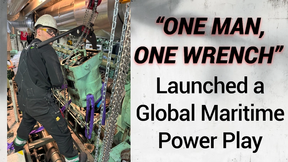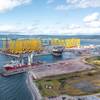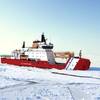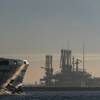Oil firms in the final stages of testing for possible millennium disturbances on Norway's offshore oil and gas platforms say they are confident there will no major mishaps at midnight on December 31. Operators say they have tested thousands of components and replaced obsolete systems and controls where potential computer bugs may have lurked.
"We cannot guarantee 100 percent but we can say that it is highly unlikely that anything will happen," said Kai Nilsen, spokesman at the state oil firm Statoil. "We have done everything to prevent any situation from happening."
Oil companies, along with the Norwegian Petroleum Directorate (NPD), began Y2K preparations as early as 1997. In the worst case, the NPD feared that a freak chain of computer failures could trigger an explosion. Firms have held meetings on millennium issues once a month to share problems and solutions in what is probably the most open forum among traditionally fierce competitors.
Gas Gets Top Priority
Norway currently produces around 3.0 million bpd of crude oil, which is expected to rise to around 3.5 million bpd next year. It is also one of the biggest suppliers of natural gas to continental Europe, sending around 25 billion cubic meters abroad per day. This is expected to rise to 74 billion cubic meters a day in 2005.
Apart from offshore platforms and onshore plants, Norway has also built up the world's largest network of submarine gas pipelines running to Britain, France, Belgium and Germany.
Altogether, it has invested around $180 billion on the continental shelf (NCS) between 1971 and 1996 and is likely to use a similar sum over the next 25 years.
The NPD, charged by the government to oversee the millennium project, said first priority was to protect personnel, the environment and assets. The next focal point of the work was to ensure that gas production and deliveries would not be interrupted.
"We can live with a short stop in oil production but it is a different case for gas. That affects our reputation as reliable suppliers," Gunnar Berge, Director of the NPD, said.
"Gas is of more direct human importance, warming houses, cooking and lighting. Pipelines must be functional, especially in winter such as Y2K night," Berge said.
Onshore Facilities Also Checked
Statoil, which is by far the largest operator on the NCS and also has responsibility for gas pipelines, has spent approximately $50 million to check and replace systems that were not millennium compliant.
Officials said that the company plans to raise pressure in the gas pipelines and fill an underground storage cavern in Germany so that consumers will continue to receive gas even if a Y2K-related problem disrupts production. "If gas supplies from us stop, customers won't feel it right away. It will be a matter of days not a few hours," said Nilsen. "If oil production stops at a facility, which again is very unlikely, it won't be any great problem, customers are not hooked directly to pipelines," he said.
He said Statoil will take precautions not to run so-called critical operations such as hooking tankers up to offshore loading buoys a few hours either side of midnight on Dec. 31. Onshore plants, such as the Kollsnes and Kaarstoe gas treatment facilities, were another concern because of dependence on utilities - offshore platforms often have their own power generators, satellite communications and water supplies. "Again at onshore plants, if power stops there will not be any physical danger as there are emergency generators to do controlled shutdown," Nilsen said.
Sverre Rusdal at BP Amoco said the company had tested around 1,500 components onshore and offshore. Several problems with metering and telecom/diagnostics were detected at the Hod field, which would have shut down oil and gas output immediately, he said. "The unique thing about the millennium is that all potential problems happen at the same time, which could lead to an unstable situation," Rusdal said. "But we have rectified faults and do not anticipate any major problems. But, of course, we cannot give any guarantees."
Norsk Hydro, the second biggest operator on the NCS, plans final exercises in November to assess preparations. Spokesman Arne Franck Nielsen said Hydro was well prepared. "We will have no higher risk this New Year's Eve than at any other time of the year," Nielsen said. The NPD's Berge was also optimistic. "We have little experience to build on, and that creates uncertainty, but we believe that we have pretty good control now." - (Tanya Pang, Reuters)
Sponsored Content
Safer Starts Here: Build Ships, Protect Crews

Featured videos

Corn Belt Ports Streamlines Critical Agriculture River Shipments

Cat Pushes Forward on Hybrid Electric Solutions, Alternative Fuels

“One Man, One Wrench” Launched a Global Maritime Power Play
July 2025
 Read the Magazine
Read the Magazine

 Read the Magazine
Read the Magazine
This issue sponsored by:

Ships to the Scrapyard Could Double to 16,000 Vessels
Subscribe for
Maritime Reporter E-News
Maritime Reporter E-News is the maritime industry's largest circulation and most authoritative ENews Service, delivered to your Email five times per week







